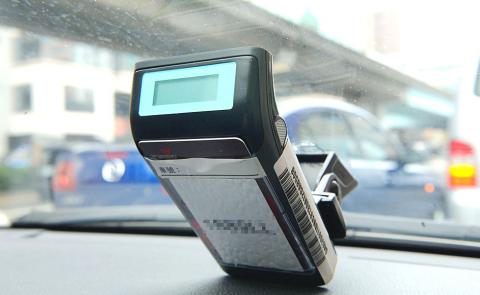Lawmakers from the legislature’s Transportation Committee yesterday questioned plans by the Ministry of Transportation and Communications to force motorists to install expensive on-board units (OBU) in preparation for freeway toll stations charging drivers by the number of kilometers they travel in 2012.
National Freeway Bureau -director-general Tseng Dar-jen (曾大仁) said the bureau recently coducted research on the policy change, during which experts simulated different toll-collecting methods and rates, in an effort to determine how the two factors affected traffic volume.
The bureau would have to analyze the results and then engage the public in dialogue on the different rate plans, adding that it had yet to finalize any plan, he said.

PHOTO: CNA
Although lawmakers were scheduled to review the budget for the National Freeway Construction and Management Fund for the next fiscal year, issues surrounding the freeway electronic toll--collecting (ETC) system quickly became the focus of a question-and-answer session at the committee.
At present, national freeway users have to pay toll fees whenever they drive through tollgates. Other than the ETC system, which requires motorists to install OBUs, motorists can pay toll fees by buying prepaid tickets.
However, the bureau is planning to change the toll-collecting method by charging users according to the distance they travel on freeways to ensure the fair use of the roads by all motorists.
The new policy would require that the great majority of users install OBUs in their vehicles.
As part of an attempt to increase installation and usage rates, Far Eastern Electronic Toll Collection Co (FETC), the contractor entrusted with the task of managing the ETC system, launched a one-year plan this month allowing motorists who have yet to install OBUs to try out the ETC system on a trial basis.
To participate in the trial, motorists must first open an account with FETC and deposit between NT$300 and NT$500. Through an image-recognition system that reads a vehicle’s license plate number, the FETC can deduct the money in the account whenever a vehicle drives through an ETC-only tollgate.
Lawmakers, however, questioned the viability of the bureau’s proposed change in the toll--collecting policy. They were also unhappy with the FETC’s plan to raise usage rates.
“If the FETC can collect toll fees through the image-recognition system, then that means you do not need an OBU to go on the freeways,” Democratic Progressive Party (DPP) Legislator Wang Sing-nan (王幸男) said, adding that the ministry should not be allowed to force motorists to install OBUs when the new toll-collecting policy takes effect.
One of the reasons why people don’t buy the OBU system is that it is considered expensive and individuals have to cover the cost of installation themselves.
DPP Legislator Yeh Yi-jin (葉宜津) and Chinese Nationalist Party (KMT) Legislator Yang Jen-fu (楊仁福) said those buying OBUs before the FETC announced its new plan were buying “a pig in a poke” because for the moment motorists did not need an OBU to drive through ETU-only toll gates.
Tseng, said the FETC’s plan was a short-term experiment not a long-term undertaking. The results of the trial period would be factored into the calculation of monthly OBU usage rate, which will be raised 42 percent by next month, he said.

Alain Robert, known as the "French Spider-Man," praised Alex Honnold as exceptionally well-prepared after the US climber completed a free solo ascent of Taipei 101 yesterday. Robert said Honnold's ascent of the 508m-tall skyscraper in just more than one-and-a-half hours without using safety ropes or equipment was a remarkable achievement. "This is my life," he said in an interview conducted in French, adding that he liked the feeling of being "on the edge of danger." The 63-year-old Frenchman climbed Taipei 101 using ropes in December 2004, taking about four hours to reach the top. On a one-to-10 scale of difficulty, Robert said Taipei 101

Nipah virus infection is to be officially listed as a category 5 notifiable infectious disease in Taiwan in March, while clinical treatment guidelines are being formulated, the Centers for Disease Control (CDC) said yesterday. With Nipah infections being reported in other countries and considering its relatively high fatality rate, the centers on Jan. 16 announced that it would be listed as a notifiable infectious disease to bolster the nation’s systematic early warning system and increase public awareness, the CDC said. Bangladesh reported four fatal cases last year in separate districts, with three linked to raw date palm sap consumption, CDC Epidemic Intelligence

US climber Alex Honnold left Taiwan this morning a day after completing a free-solo ascent of Taipei 101, a feat that drew cheers from onlookers and gained widespread international attention. Honnold yesterday scaled the 101-story skyscraper without a rope or safety harness. The climb — the highest urban free-solo ascent ever attempted — took just more than 90 minutes and was streamed live on Netflix. It was covered by major international news outlets including CNN, the New York Times, the Guardian and the Wall Street Journal. As Honnold prepared to leave Taiwan today, he attracted a crowd when he and his wife, Sanni,

Taiwanese and US defense groups are collaborating to introduce deployable, semi-autonomous manufacturing systems for drones and components in a boost to the nation’s supply chain resilience. Taiwan’s G-Tech Optroelectronics Corp subsidiary GTOC and the US’ Aerkomm Inc on Friday announced an agreement with fellow US-based Firestorm Lab to adopt the latter’s xCell, a technology featuring 3D printers fitted in 6.1m container units. The systems enable aerial platforms and parts to be produced in high volumes from dispersed nodes capable of rapid redeployment, to minimize the risk of enemy strikes and to meet field requirements, they said. Firestorm chief technology officer Ian Muceus said